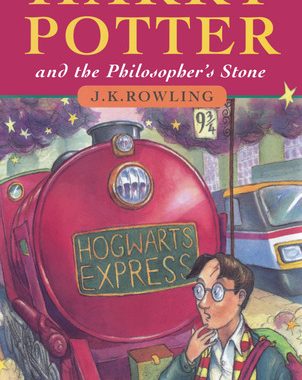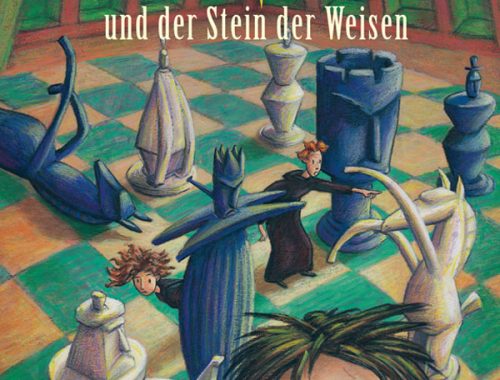Back at last to the Trilingual Harry Potter Reread! When last we left Harry Potter and the Philosopher’s Stone, Harry and Draco had spent a lot of time going “grr” at one another, setting up a long and honorable tradition of them doing that all throughout the series. Now finally I’m heading into Chapter 10, wherein we’ll finally settle the triad of three primary characters into place–courtesy of a troll!
General Commentary
We start off the chapter with Harry and Ron having been snubbed by Hermione, who is refusing to speak to them–and how the boys count this as a plus since she is such a “bossy know-it-all”. I grimace at this language, but on the other hand, I know what’s coming. And I also know that we’re in the POV of an eleven-year-old kid here, so I’m willing to cut a little slack.
I do have to eye McGonagall’s sending Harry the broom a bit askance, though. Not that she did it in general, but that she made a point of sending along a note telling him not to open it in the dining hall. I’d think that if she didn’t want him to open it where he could be observed, she might have, oh, I dunno, not had the owls drop it off in plain sight. That Harry gets something that’s pretty obviously broomstick-shaped is bound to have raised a few eyebrows, even other than Draco’s.
A good stretch of this chapter is given over to Oliver Wood telling Harry the rules of Quidditch. Much has been written all over the Net about whether these rules make any sense. For me, as a reader, it all pretty much amounts to “magical sportsball”. So whatevs, I’m rolling with it!
Hermione crying at her harsh treatment is wince-inducing for any reader who’s ever been bullied or made fun of at school, I expect. I winced at it as an adult. I can only imagine how it must have read to young readers the same age as Harry, Ron, and especially Hermione.
Meanwhile, wait, the Hogwarts Hallowe’en decorations involve live bats? One hopes that the staff have arranged spells for getting rid of the guano.
But then, of course, we have the action of the troll showing up. It’s a great scene, and while I am a little disgruntled that Hermione spends the actual fight being too frightened to do anything, she makes up for it by covering for Harry and Ron. And the chapter ends with the three of them having sealed their friendship, yay!
Two Countries Separated by a Common Language
“Hallowe’en” has an apostrophe in the UK edition. In the US edition, it does not.
During the Halloween feast, in the UK edition, Harry helps himself to a “jacket potato”. In the US edition, it’s a “baked potato”.
What comes out of the troll’s nose is “bogies” in the UK edition, and “boogers” in the US. Either way, one must imagine this book’s target age group giggling at the notion of troll boogers. Because I mean honestly, eeeew!
Four Things About the French Edition
“Halloween” has no apostrophe in the French edition, either.
Professor McGonagall signs her note to Harry as “Professeur McGonagall”, without the initial that does appear in all the other editions I’ve got. Curious that the French translator chose to leave this out.
When Oliver Wood–or, rather, Olivier Dubois–comes and finds Harry on the Quidditch field, in the English edition, he tells him that “you really are a natural”. In French, he says “tu as vraiment un don”, which means “you really have a gift”. What catches my eye here is the use of the word “don” for gift. I’m used to seeing the word “cadeau”. But this does make a sudden kind of sense, because I can easily see the connection to the English word “donate”!
McGonagall, in the final scene, calls Hermione “Miss Granger” in French. Not “Mademoiselle”. But unlike in the German edition, I noted that Harry called Professor Flitwick “monsieur”, and not “sir”. So the translators in general are showing an interesting inconsistency in how forms of address are handled, and I’m not sure what’s deliberate here, or whether this was an error on the translator’s part.
French Worldbuilding Terms
The Quidditch field in French is “le terrain de Quidditch”.
The terms for the Quidditch players in French are:
- “poursuiveurs” for the Chasers, which is a pretty decent direct translation;
- “gardien” for the Keeper, which is not quite as direct a translation since the obvious English analog here is “guardian”, but this word can also mean “keeper” or “custodian”, so that’s all good;
- “batteur” for the Beaters and “attrapeur” for the Seeker, which we knew from the previous chapter.
The terms for the Quidditch balls are:
- “Souafle” for the Quaffle, which, interesting that the translator didn’t give it a Q to start with, since that letter does exist in French;
- “Cognards” for the Bludgers, and I’m not finding a direct translation for this word but it seems to be related to the verb “cogner”, which means “to bang”, so, apt;
- “Vif d’or” for the Golden Snitch, which is interesting, since I know “vif” mostly as an adjective meaning “lively” or “quick”; here, though, Vif is clearly a noun. The Reverso.net page for the word suggests that it might be used in the sense of “heart”.
Ah, and I’m not sure I noticed this in a previous chapter, but Lavender shows up named Lavande in French.
Five Things About the German Edition
No apostrophe in “Halloween” in German!
In the scene where Hermione stomps past the boys, pointedly not speaking to them, she’s described in the English and French editions as having her nose in the air. In German, however, there’s a different phrase: “Hermine warf den Kopf in den Nacken”. This apparently translates to “Hermione threw her head back”. Same general motion, but a different way of describing it.
Harry addresses Professor Flitwick as “Sir” in the German edition, interestingly. Similarly, later in the chapter, McGonagall calls Hermione “Miss Granger”.
Longest word spotted in the German edition: “Mannschaftstraining”! 19 letters. It means “team training”, which is what Harry’s going to participate in with the Gryffindor Quidditch team three times a week.
In the scene where Professor Quirrell runs in to report the troll, in the sentence describing Harry about to eat his baked potato, the German sentence reads “Harry nahm sich gerade eine Pellkartoffel”. The verb “nahm sich” is I think actually the past tense of “sich nehmen”, which means “to help yourself to something”. But it still reads like Harry’s nomming himself a potato!
German Worldbuilding Terms
The Quidditch field in German is “der Quidditch-Feld”.
The terms for the Quidditch players in German are:
- “Jäger” for the Chasers, which actually translates to Hunters in German, and I knew that, ha! And now I will totally be thinking of Pacific Rim here, and you TOTALLY know that kaiju would make a Quidditch game even more entertaining;
- “Hüter” for the Keeper, which means “guardian”, similarly to the term in French;
- “Treiber” for the Beaters, and “Sucher” for the Seeker, which we already got from the previous chapter.
The terms for the Quidditch balls in German are:
- “Quaffel”, which is practically the same as the English Quaffle;
- “Klatscher” for the Bludgers, which amuses me for a couple of reasons–one, that this word is apparently related to “gossip”, which, of course, duh because “coffeeklatsch” is a thing in English, and two, because the Reverso.net German->English dictionary totally references the Potter books for examples of this word here;
- “Golden Schnatz” for the Snitch.
And in closing
I do like this chapter overall for finally getting the three main characters into a unified force for mischief. I’m less interested in the Quidditch per se, but it is an important plot motivator for many of Harry’s adventures–so it’s no real surprise that we’ll have more of that next time in Chapter 11!


